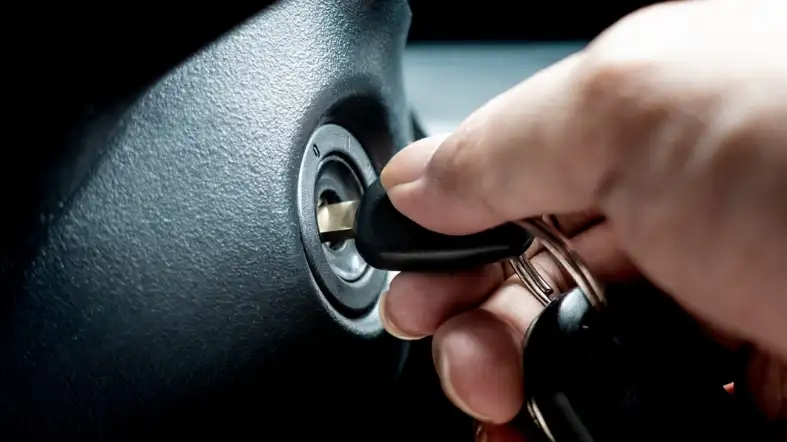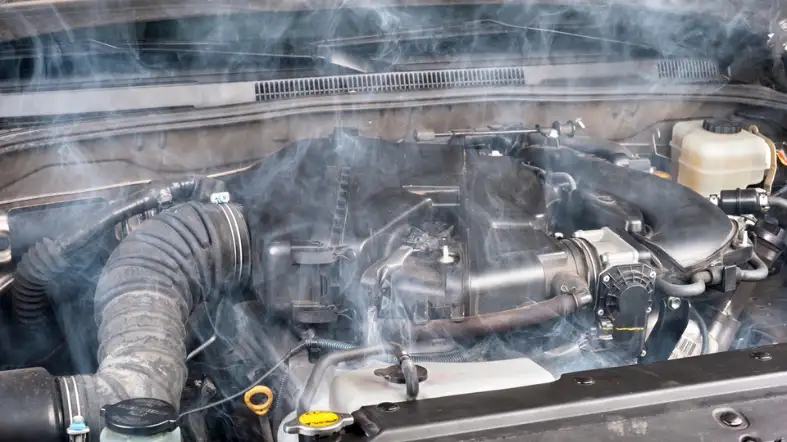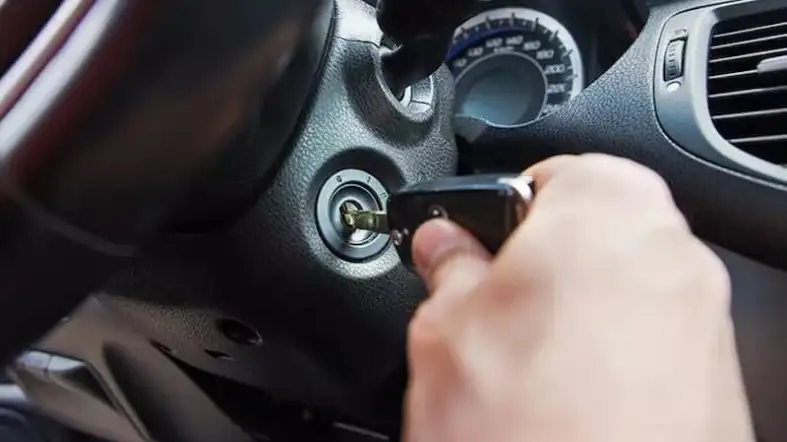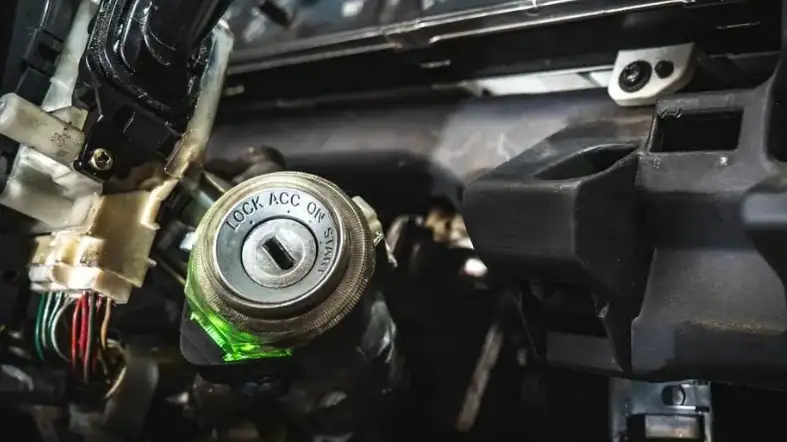Have you ever heard that a bad starter can cause your engine to lock up? It’s a question that’s been asked time and time again and for good reason.
After all, the engine is the heart of your car, and the last thing you want is for it to seize up due to a faulty starter.
But is there any truth to this common belief, or is it just a myth perpetuated by car owners and mechanics alike?
In this blog, we’re going to dive deep into the world of car starters and engines to find out once and for all whether a bad starter can indeed lock up your engine.
Can a bad starter lock up an engine?
Yes, a bad starter can potentially lock up an engine.

The starter is responsible for turning the engine over so that it can start running.
If the starter is malfunctioning or has failed completely, it may not be able to turn the engine over. This can cause the engine to become “locked up” and unable to move.
How Does a Starter Lock Up the Engine?
When a starter locks up an engine, it means that the starter motor is unable to turn the engine over.
This can happen due to a variety of reasons, and it can cause serious damage to both the starter and the engine if not addressed promptly.
Here are some of the most common causes of a starter locking up an engine:
1. Dead battery:
A dead battery is one of the most common reasons for a starter to lock up an engine.
If the battery is not providing enough power to the starter, it won’t be able to turn the engine over.
In some cases, a weak battery may still provide enough power to engage the starter, but it may not have enough juice to turn the engine over.
2. Faulty starter motor:
A faulty starter motor can also cause the engine to lock up. If the starter motor is not functioning properly, it won’t be able to turn the engine over.
This can be due to a variety of reasons, such as a worn-out starter motor, a damaged starter solenoid, or a faulty starter relay.
3. Engine problems:
There are a number of engine problems that can cause the engine to lock up, such as a seized piston, a broken timing belt, or a damaged crankshaft.
These issues can prevent the engine from turning over, which can cause the starter to lock up.
4. Ignition switch issues:
The ignition switch is responsible for sending power to the starter motor.
If the ignition switch is faulty or damaged, it may not be able to send power to the starter motor, which can cause the engine to lock up.
5. Mechanical issues:
There are a number of mechanical issues that can cause the engine to lock up, such as a damaged flywheel, a damaged starter gear, or a blocked air intake.
These issues can prevent the engine from turning over, which can cause the starter to lock up.
What are the symptoms of an engine lock-up?

An engine lock up can be a scary experience for any driver, as it can cause the vehicle to come to a sudden stop and may even lead to serious accidents.
Engine lock up occurs when the engine seizes or stops rotating altogether. In this situation, the engine will not start, and it may need to be repaired or replaced.
Here are the symptoms of an engine lock up that you should be aware of:
1. Loss of Power:
One of the first signs of an engine lock-up is a sudden loss of power.
You may notice that your vehicle doesn’t accelerate as it normally would or struggles to reach its usual speed.
This decrease in power can make driving difficult and unsafe.
2. Unusual Sounds:
Another common symptom of engine lock-up is hearing unusual sounds coming from the engine.
These sounds might include grinding, knocking, or clunking noises, which indicate that something serious is wrong with the engine.
These noises should never be ignored and require immediate attention.
3. Overheating:
Engine lock-up can lead to overheating because the coolant can no longer circulate through the engine.
This lack of proper cooling can cause the engine to overheat, potentially causing severe engine damage and leading to engine failure.
If you notice your temperature gauge climbing rapidly, it’s crucial to stop driving and address the issue.
4. Warning Lights:
When the engine locks up, your vehicle’s warning lights may come on.
You might see the check engine light, oil pressure light, or temperature light illuminating, indicating a problem with the engine.
These warning lights serve as a signal to take immediate action and have your vehicle inspected by a professional mechanic.
5. Smoke:
Smoke emanating from the engine or exhaust system is another unmistakable sign of engine lock-up.
This indicates a severe issue with the engine, and you must pull over immediately, turn off the engine, and seek assistance.
Continuing to drive under these conditions can cause further damage to the engine or lead to a fire hazard.
What to do if a Starter Lock Up the Engine?

If your car’s starter motor is causing the engine to lock up, it can be a frustrating and potentially costly problem.
However, there are a few steps you can take to troubleshoot and resolve the issue. Here are some things you can do:
1. Turn off the ignition:
The first thing you should do is turn off the ignition and remove the key from the ignition switch.
This will prevent any further damage to the engine and allow you to safely assess the problem.
2. Check the battery:
One of the most common causes of a starter lock-up is a dead battery. Check your battery’s voltage with a multimeter.
If the voltage is low, recharge the battery or replace it if it is too old.
3. Inspect the starter:
The next step is to inspect the starter motor. Look for any signs of damage or wear, such as loose wires or corroded terminals.
Also, check the starter’s solenoid and make sure it is functioning properly.
4. Check the flywheel:
The flywheel is a large metal wheel that connects the engine to the transmission.
If the starter’s gear teeth are damaged or worn, it can cause the starter motor to lock up. Inspect the flywheel for any signs of damage and replace it if necessary.
5. Check the ignition switch:
The ignition switch sends a signal to the starter motor to engage. If the switch is faulty, it can cause the starter motor to lock up.
Check the switch’s connections and replace it if necessary.
6. Seek professional help:
If you are unable to resolve the issue, it is best to seek the help of a professional mechanic.
They have the expertise and tools necessary to diagnose and fix the problem.
How to prevent a Starter from Locking Up the Engine?

Starter motors are essential components in starting an engine. They use an electric motor to rotate the engine’s crankshaft and initiate the combustion process.
However, if the starter motor is used for too long, it can cause the engine to lock up. This can be a frustrating and costly experience.
Here are some tips on how to prevent a starter from locking up your engine:
1. Use the starter only when necessary:
One of the primary causes of engine lockup is excessive use of the starter motor. It’s crucial to use the starter only when necessary.
If you’re having difficulty starting your engine, check the battery, fuel, and ignition system before engaging the starter motor.
2. Avoid using the starter for too long:
When you engage the starter motor, it creates a large current draw from the battery.
If you use it for too long, it can cause the battery to drain quickly, which can lead to engine lockup.
To avoid this, limit the time you use the starter motor to 10 seconds or less.
3. Keep the starter motor in good condition:
Regular maintenance of the starter motor can help prevent engine lockup. Check the starter motor’s wiring, connections, and brushes for wear and tear.
Replace any worn or damaged parts promptly.
4. Keep the battery charged:
A weak or dead battery can cause the starter motor to work harder, leading to engine lockup. Make sure your battery is fully charged and in good condition.
5. Use the proper starting technique:
When using the starter motor, use the proper starting technique.
Turn off all accessories and depress the clutch (or put the transmission in neutral) before engaging the starter motor.
6. Warm up the engine before driving:
After starting the engine, allow it to warm up before driving. This will ensure that the engine has reached its optimal operating temperature and will reduce the risk of engine lockup.
FAQs
Q. Can a bad starter damage the engine permanently?
A: While a bad starter can cause inconvenience and potential engine damage, it is not typically a direct cause of permanent engine damage. However, if left unaddressed, a continuously engaged starter can cause wear on the flywheel or flexplate, leading to more severe issues.
Q. Are there any warning signs before a starter locks up the engine?
A: Yes, there are usually warning signs of a failing starter, such as slow cranking, clicking noises, or intermittent starting problems. Paying attention to these signs can help you address the issue before it leads to a locked-up engine.
Q. What Should I Do If My Starter Is Going Bad?
If you suspect that your starter is going bad, it’s important to have it checked by a qualified mechanic as soon as possible.
Ignoring the problem can lead to more serious and expensive issues down the line, including engine damage or failure.
Conclusion
A bad starter can potentially lock up an engine if left unchecked for too long.
When a starter malfunctions, it can cause the engine to not turn over properly, which in turn can lead to damage to the engine’s components such as the flywheel or starter gear.
If these components become damaged, they may jam up and prevent the engine from turning at all, resulting in a locked-up engine.
It’s crucial to properly diagnose the root cause of the problem before attempting any repairs.
